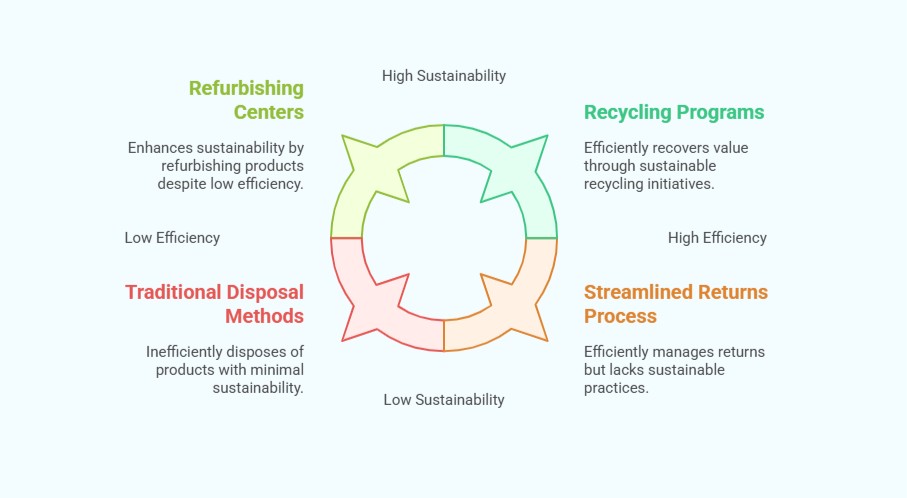
This training course offers a comprehensive understanding of reverse logistics and returns management, essential for optimizing supply chain efficiency and sustainability. Participants will delve into the critical processes involved in managing products moving from the customer back through the supply chain, covering everything from initial returns to final disposition. The course aims to equip professionals with the knowledge and tools to design and implement effective reverse logistics strategies, minimizing costs and maximizing value recovery.
The course will cover a range of topics including the different types of reverse logistics, efficient returns processes, transportation and handling of returned goods, and various disposition options such as repair, recycling, and remarketing. Emphasis will be placed on leveraging technology and data to streamline operations, comply with regulations, and measure the financial and environmental impact of reverse logistics initiatives.
Who Should Attend the Training
Objectives of the Training
Personal Benefits
Organizational Benefits
Training Methodology
Trainer Experience
Our trainers are seasoned professionals with extensive hands-on experience in reverse logistics and supply chain management across diverse industries. They bring practical insights and a deep understanding of the complexities involved in managing product returns and maximizing value recovery. Their expertise ensures a relevant and engaging learning experience, providing participants with actionable strategies.
Quality Statement
We are committed to delivering high-quality training programs that are relevant, practical, and impactful. Our courses are designed to provide participants with immediately applicable skills and knowledge, ensuring a significant return on their training investment.
Tailor-made courses
We offer customized training solutions designed to meet the specific needs and challenges of your organization. Contact us to discuss how we can tailor this or any other course to your unique requirements.
Course Duration: 5 days
Training fee: USD 1300
Module 1: Fundamentals of Reverse Logistics
Module 2: Returns Management Processes
Module 3: Collection and Transportation in Reverse Logistics
Module 4: Sorting, Inspection, and Disposition
Module 5: Remanufacturing, Refurbishment, and Repair
Module 6: Recycling and Waste Management
Module 7: Technology in Reverse Logistics
Module 8: Legal and Regulatory Aspects
Module 9: Financial and Economic Considerations
Module 10: Building a Sustainable Reverse Logistics Strategy
Requirements:
· Participants should be reasonably proficient in English.
· Applicants must live up to Armstrong Global Institute admission criteria.
Terms and Conditions
1. Discounts: Organizations sponsoring Four Participants will have the 5th attend Free
2. What is catered for by the Course Fees: Fees cater for all requirements for the training – Learning materials, Lunches, Teas, Snacks and Certification. All participants will additionally cater for their travel and accommodation expenses, visa application, insurance, and other personal expenses.
3. Certificate Awarded: Participants are awarded Certificates of Participation at the end of the training.
4. The program content shown here is for guidance purposes only. Our continuous course improvement process may lead to changes in topics and course structure.
5. Approval of Course: Our Programs are NITA Approved. Participating organizations can therefore claim reimbursement on fees paid in accordance with NITA Rules.
Booking for Training
Simply send an email to the Training Officer on training@armstrongglobalinstitute.com and we will send you a registration form. We advise you to book early to avoid missing a seat to this training.
Or call us on +254720272325 / +254725012095 / +254724452588
Payment Options
We provide 3 payment options, choose one for your convenience, and kindly make payments at least 5 days before the Training start date to reserve your seat:
1. Groups of 5 People and Above – Cheque Payments to: Armstrong Global Training & Development Center Limited should be paid in advance, 5 days to the training.
2. Invoice: We can send a bill directly to you or your company.
3. Deposit directly into Bank Account (Account details provided upon request)
Cancellation Policy
1. Payment for all courses includes a registration fee, which is non-refundable, and equals 15% of the total sum of the course fee.
2. Participants may cancel attendance 14 days or more prior to the training commencement date.
3. No refunds will be made 14 days or less before the training commencement date. However, participants who are unable to attend may opt to attend a similar training course at a later date or send a substitute participant provided the participation criteria have been met.
Tailor Made Courses
This training course can also be customized for your institution upon request for a minimum of 5 participants. You can have it conducted at our Training Centre or at a convenient location. For further inquiries, please contact us on Tel: +254720272325 / +254725012095 / +254724452588 or Email training@armstrongglobalinstitute.com
Accommodation and Airport Transfer
Accommodation and Airport Transfer is arranged upon request and at extra cost. For reservations contact the Training Officer on Email: training@armstrongglobalinstitute.com or on Tel: +254720272325 / +254725012095 / +254724452588
| Course Dates | Venue | Fees | Enroll |
|---|

Armstrong Global Institute
Typically replies in minutes